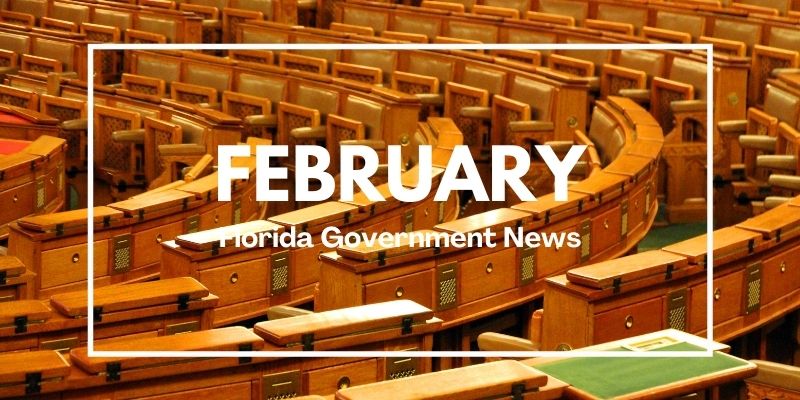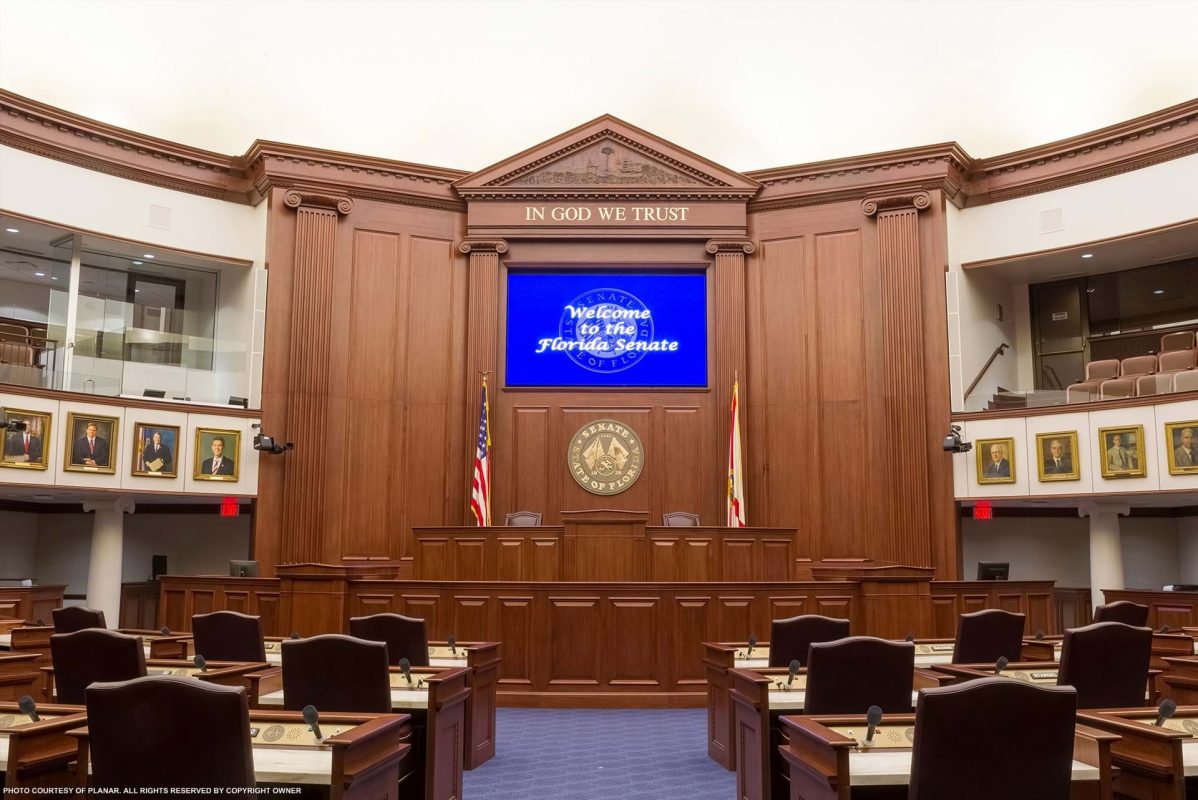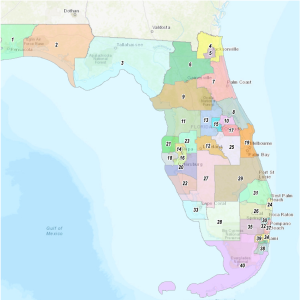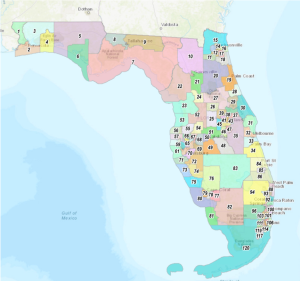
It’s the start of the final week of Florida’s 2022 legislative session. In this post, we will provide an update on the decennial redistricting process, and on some of the significant bills that seem likely to pass this year.
Redistricting
Previously, we reviewed the Legislature’s progress on the redrawing of Florida’s congressional and state legislative district maps that follows each decennial census. (Sparker’s Soapbox, 1/7/22, and Sparker’s Soapbox, 2/7/22)
Since then, the Florida Supreme Court signed off on the Florida Senate and House maps agreed to by the legislature last month. These maps will serve as the political boundaries for the 40-member Senate and the 120-member House for the next decade.
Republicans Maintain Solid Control
A performance analysis of the new maps based on how the new districts would have voted in the 2020 presidential election shows that while Democrats are likely to gain seats in both chambers, Republicans will retain their solid majorities. Specifically, the Senate map gives Republicans a likely 23-17 advantage over Democrats in the 40-member chamber — a one-seat pickup for Democrats over the current map. The House map gives Democrats as many as eight additional seats in the 120-member House, potentially reducing the Republican majority to 71 from 79, and increasing the Democratic share to 49. (Florida Politics, 3/3/22)
Will Voting Rights Groups Challenge the Maps?
FairDistricts Now and its consortium of voting advocates said it will not oppose the maps. (Miami Herald, 2/15/22)
But the Democratic House leader was not ruling it out. (Tampa Bay Times, 3/3/22)
Congressional Map Remains Unresolved
As for the congressional map, over which — unlike the legislative maps — the governor has veto power, Gov. Ron DeSantis contends that a sprawling North Florida district that was drawn in the past to help elect a minority and was largely retained in the Senate’s proposal is unconstitutional. Interceding in what is constitutionally a legislative authority, he put out his own congressional map and vowed to veto the map prepared by the Senate and House. (Florida Politics, 1/17/22)
On Mar. 4, the House passed and the Senate subsequently accepted 2 congressional maps for passage, one that reflects DeSantis’s map and another one similar to the map the Senate initially approved. Should the Governor veto them, the legislature will either be forced to go back to the drawing board or the courts will intervene.
Florida is just one of four states left in the nation without approved congressional maps, raising a host of legal questions since the state needs to redraw its districts after picking up a new seat during the once-in-a-decade census. (Politico Florida, 3/4/22)
2022 Legislative Session
Last month, we reviewed the opening weeks of the Legislative session that began on Jan. 11, including the priorities of Gov. Ron DeSantis, Senate President Wilton Simpson, and House Speaker Chris Sprowls. (Sparker’s Soapbox, 2/7/22)
No Surprise: Another Record Budget Likely

The House and Senate are in final budget negotiations. With the state flush with federal stimulus money and higher-than-expected sales tax revenues, both chambers have passed record budgets. The House budget totals $105.3 billion; the Senate proposal totals $108.6 billion. Key differences to be resolved in the final days of session relate to school funding, a pay raise for state workers, affordable housing, and hospitals. (USA Today Network-Florida via Tallahassee Democrat, 2/17/22; News Service of Florida via Tampa Bay Times, 3/2/22)
Bills to Implement DeSantis’s Priorities
As we noted last month, bills to address leaders’ priorities — especially those the governor supports — were likely to move quickly and ultimately become law, given Republican control of both legislative chambers.

Here is an update on DeSantis’s priority bills:
Individual Freedom (aka the “Stop WOKE Act”; aka “Erase History”) has passed the House on a party-line vote and is headed to the Senate floor for consideration. The bill would prohibit public schools and private businesses from inflicting “discomfort” on white people during lessons or training about discrimination. While the bill doesn’t specifically mention Critical Race Theory, DeSantis said in December the bill would keep it out of schools. (ABC Action News, 3/3/22; SB 148 / HB 7)
Immigration Enforcement has passed the Senate and is headed for a vote on the House floor. It would bar the state and local governments from contracting with transportation companies “if the carrier is willfully providing any service in furtherance of transporting an unauthorized alien into the State of Florida knowing that the unauthorized alien entered into or remains in the United States in violation of law.” (WFSU Public Media, 3/4/22; SB 1808 / HB 1355)
Election Administration has also passed the Senate on a party-line vote and is headed for a vote on the House floor. Among other changes, the bill creates a state Office of Election Crimes and Security. But after drawing heavy attention, it was significantly revamped, including scaling back proposed changes to mail-in voting. (News Service of Florida via cltampa.com, 2/23/22; Miami Herald, 3/4/22; CS/SB 524 / HB 7061)
Fetal and Infant Mortality Reduction has passed both chambers and Gov. DeSantis has said he will sign it. The bill bans nearly all abortions after 15 weeks, with exceptions for pregnancies where the mother’s life or serious bodily function is in danger, or when there is a fatal fetal abnormality. Based on Mississippi’s 15-week ban, which is currently under court review, the bill would implement some of the strictest abortion limitations in the nation. (Florida Politics, 3/4/22; S 146 / CS/HB 5)
Bills to Implement Sen. President Simpson’s Priorities
In last month’s post, we also laid out the priorities of Senate President Wilton Simpson and House Speaker Chris Sprowls. Here’s where Simpson’s priority bills stand:

Child Welfare has passed both chambers. It increases monthly payments for foster parents and caregivers and other assistance aimed at benefiting the lives of foster youth. (SB 7034)
$15 Minimum Wage has been agreed to by House and Senate budget negotiators. (News Service of Florida via Tampa Bay Times, 3/2/22)
New Spending for Florida Agriculture — Simpson, who is running to succeed Democrat Agriculture Commissioner Nikki Fried, has proposed $300 million in new ag spending. But it comes with a catch: It can’t be spent until after the election. (Tampa Bay Times, 3/2/22; SB 2508)
Bills to Implement House Speaker Sprowls’ Priorities

Additional Property Tax Exemption for Critical Public Service Workers has passed the House and is headed to the Senate floor. It proposes a constitutional amendment to create another homestead exemption on the assessed value of property from $100,000 to $150,000 for eligible first responders, teachers, and military members. (Florida Politics, 2/28/22; HJR 1)
Law enforcement support has passed the House and awaits Senate consideration. DeSantis often touts the package as a recruitment tool targeting cops in progressive cities. (Florida Politics, 3/2/22; HB 3)
Consumer Data Privacy has passed the House and could be a bargaining chip in negotiations with the Senate. It would give consumers the right to determine what information could be collected, to delete or correct the data, and opt-out of the sale or sharing of that personal information. (Florida Politics, 3/2/22; HB 9)
Other Bills to Watch
Education

K-12 Education has passed the House and is under consideration in the Senate. An extension of Republicans’ recent push to increase parental rights and involvement in students’ education, the measure is largely centered on giving parents and members of the public broader access to the process of selecting — and eliminating — library books and instructional materials. (News Service of Florida via WUSF Public Media, 3/2/22; HB 1467)
Parental Rights in Education (aka the “Don’t Say Gay” bill) has passed the House and is scheduled for a Senate vote. It would prohibit discussion about sexual orientation or gender identity in the classroom when it’s not age-appropriate. Students staged walkouts across the state last week to protest the bill. (TheHill.com, 3/4/22; SB 1834 / HB 1557)
Student Assessments has unanimously passed the Senate and has yet to have a House floor hearing. The bill would replace the Florida Standards Assessment (FSA) with a computer-based progress monitoring screening in English language arts and mathematics, a DeSantis priority. Otherwise, it would keep all other current state standardized tests including End of Course assessments and the elementary and middle school science assessment. (Florida Politics, 3/3/22; SB 1048 / HB 1193)
School Board Term Limits passed the House on a party-line vote. The bill would impose 12-year term limits on locally-elected school board members, ignoring the fact that the Florida Constitution gives local school boards authority and power to oversee the operations of public schools. It is expected to be heard on the Senate floor. (Florida Politics, 2/28/22; CS/HB 1467
Environment

Statewide Flooding and Sea Level Rise Resilience passed favorably through the House and is pending in the Senate. The bill would create a statewide resilience office under the governor’s office and allow for the appointment of a chief resilience officer. It would also require the Department of Environmental Protection to put together a sea level rise and vulnerability data set. In addition, it would require the Department of Transportation to create a resiliency action plan for the state’s highways. (TheHill.com, 3/3/22; SB 1940 / HB 7053)
Environmental Resources was a late-filed piece of legislation that environmentalists said posed a major threat to Everglades restoration and south Florida’s clean water progress to benefit the sugar industry. After considerable public outcry and a veto threat from the governor, much of the original proposal was reversed. But environmental advocates are still calling for the bill to be vetoed. (Tampa Bay Times, 2/17/22; The News-Press, 2/28/22; SB 2058 / HB 5001)
Net Metering passed the House; ready for Senate floor debate. The much-debated plan would change the rules for rooftop solar, potentially making it more expensive for future users. (WSFU Public Media, 3/4/22; SB 1024 / HB 741)
Public Safety
Building Safety unanimously passed the House and is scheduled for a vote in the Senate. It would require statewide recertification of any condo building above three stories high. (Associated Press, 2/24/22; CS/CS/SB 1702)
Nursing Homes passed the House and is scheduled for a vote in the Senate. The measure would give nursing homes more staffing flexibility by reducing the minimum number of hours certified nursing assistants are required to spend caring for each nursing home resident. It is opposed by AARP, which warns it will lead to inadequate care. (Tampa Bay Times, 2/28/22); CS/CS/HB 1239)
News from Washington
All Florida voters elect the state’s two U.S. Senators.
Florida’s U.S. Senators are Marco Rubio and Rick Scott.
Scott, Rubio Urge Russia Sanctions
- Sen. Rick Scott: U.S. must issue devastating sanctions that cripple the Russian oligarchy & Putin’s thugs. Scott Press Release, 2/24/22
- Rubio, Grassley introduce bill to sanction all Russian state-owned enterprises. Rubio Press Release, 3/2/22
Scott’s “Plan to Rescue America”
Rick Scott released an 11-point “Plan to Rescue America” ahead of his appearance at the recent Conservative Political Action Conference in Orlando. (Miami Herald, 2/22/22; rescuramerica.com)
Scott has spent over a million dollars from his own PAC on a national ad buy, seemingly strategically timed as he leads the National Republican Senatorial Committee amid rumors that former President Donald Trump wants Scott to supplant “Old Crow” Sen. Mitch McConnell as caucus leader. (Florida Politics, 3/1/22)
McConnell did not hold back in divorcing the caucus from Scott’s plan, and said, “If we’re fortunate enough to have the majority next year, I’ll be the Majority Leader,” McConnell said. (Florida Politics, 3/1/22)
That’s it for Florida government news for February. In my next state news post, we’ll share highlights from the last week of session.



